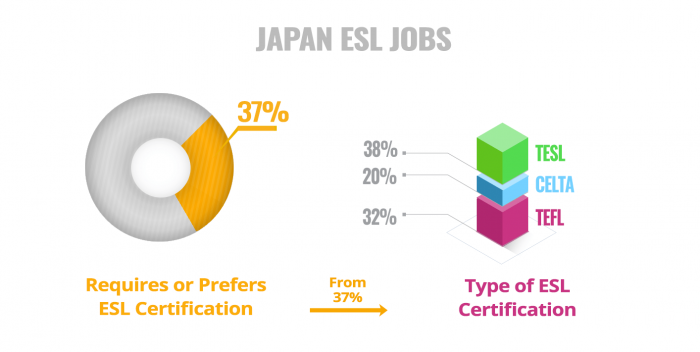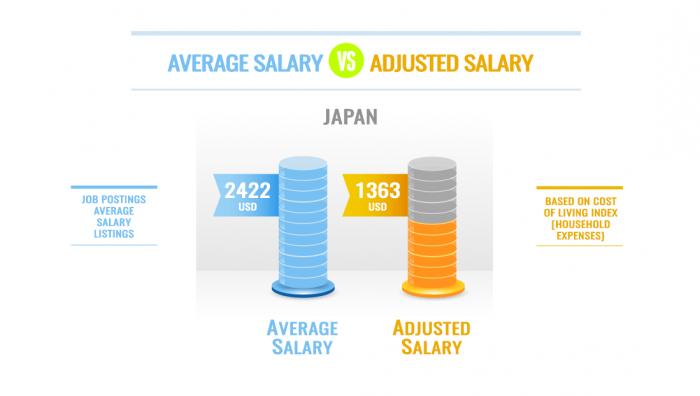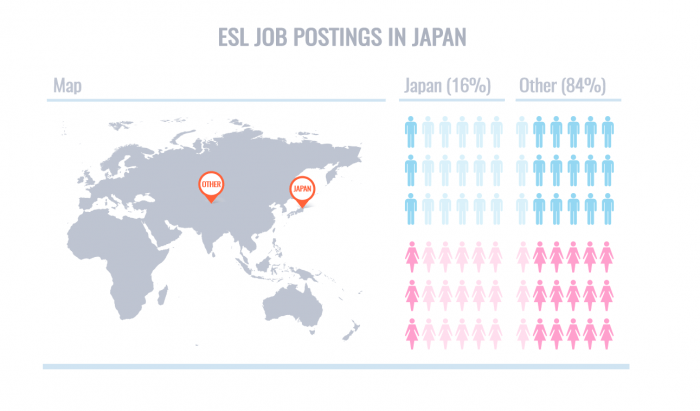Teaching English in Japan

Teaching English in Japan
Requirements
Bachelor’s Degree: Required
Monthly Salary: $1,700 to 5,000 USD
Peak Hiring: All year round
Visa Information: Work visa before entry
Housing: Compensated or subsidized
Airfare: Reimbursed depending on the employer
Student Types: Business English and children
Overview
Japanese culture is an interesting mix of modern technology and traditional architecture. It’s well-organized, safe, and has a lot of opportunities to advance. Especially if you can speak the language, you have lots of space to grow and develop your career. Japan is the most sought-after destination for English teachers. There is no other location more popular than teaching English in Japan.
If you want to teach English in Japan, you need an undergraduate degree and a criminal record check. TEFL certification is recommended so you have basic teaching skills before your first class. You don’t need to be a native speaker of English. But there is a bit of an unspoken preference for native speakers. Comparatively, Japan offers the best balance between work and play. Teaching hours are generally less and vacation days are more generous.
No other country in the world is as well-organized as Japan. They say you can set your time on a train’s arrival time. The atmosphere is a bit formal in Japan and work is taken very seriously. Most likely, your employer will want you to wear a suit and tie on the job. But don’t wear a black tie or they’ll think you’re attending a funeral.
Pros of Teaching English in Japan
Cons of Teaching English in Japan
English Language Schools in Japan
Japan is such a large country that people come in and out of schools all the time. Because of the massive amount of turnover in Japan, some recommend just traveling to Japan. Once you’re there, you can look for schools that are directly hiring to replace someone who is leaving.
An Eikaiwa is a specialized English Language school. For Japanese people who want to improve their English, they go to an Eikaiwa to interact with a native speaker. For example, Nova, Interac, and Berlitz are some of the largest Eikaiwa and recruit year-round.
JET Programme

JET Programme – The JET Programme has sent more than 70,000 participants from around the globe. JET hires foreign teachers to work in schools, boards of education, and government offices throughout Japan. The hiring process is rigorous to get accepted. But it’s worth the time and effort.
The JET Programme is not an easy program to get accepted into. It’s also known for placing foreign teachers in smaller cities and rural areas. First, you need the following requirements to be considered:
- Have a Bachelor’s Degree
- Be a fluent speaker of English
- Be a citizen of the country you are applying from
Salary
English teacher salaries are some of the most competitive in the world in Japan. Depending on your location, you can earn anywhere from 200,000 to 600,000 yen ($1,700 – 5,000 USD) per month teaching English in Japan.
But keep in mind that Japan has some of the highest costs of living in the world. The countryside is much cheaper for living costs. But larger cities like Tokyo and Osaka are the most expensive.
Another benefit of teaching English in Japan is that schools chip in for housing and flight costs. Some of the common benefits are subsidized rent, airfare allowance, medical insurance, and earning a bonus on completion.
| Monthly Salary | Total |
|---|---|
| US Dollars (USD) | 1,700 to 5,000 USD |
| Japanese Yen (JPY) | 200,000 to 600,000 JPY |
Certification
English is a global language, and it’s only natural that it’d be of interest to people all over the world. The Japanese are no exception to this rule, with many Japanese people being interested in learning English as a second language.

If you’re an English speaker looking for work teaching languages or if you just want to travel and immerse yourself in another culture, there are many opportunities for teaching English as a foreign language in Japan.
Although teaching English as a foreign language is an appealing career option for many people, you have to be prepared to be an effective teacher in the classroom. This is why TEFL certification is a way to help you get prior teaching experience and to brush up on your grammar skills. Here are our recommended TEFL certificate programs to get started teaching English in Japan.
Frequently Asked Questions
You can make anywhere from 200,000 to 600,000 yen ($1,700 – 5,000 USD) per month teaching English in Japan.
Yes, you need a Bachelor’s degree or better to teach English in Japan.
According to the Global Peace Index, Japan is one of the top 10 safest countries in the world. You don’t have to worry about your wallet getting stolen as it has a very low crime rate. But don’t leave your bicycle unlocked because they tend to get borrowed by salarymen.
Although it’s helpful, you don’t have to speak Japanese to teach English in Japan. If you can learn the basic grammar structure, it’s useful for picking up on mistakes from your students.
You need a Bachelor’s degree and a police background check. Some schools also request teachers to obtain their TEFL certification.
Although every situation is different, students are generally more respectful towards teachers. Japanese people tend to keep to themselves and are more introverted.








